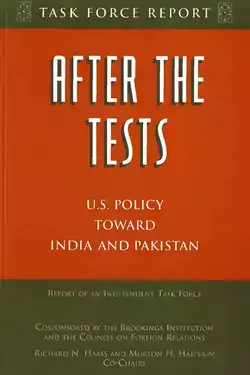Task Force Members:
Richard K. Betts is professor of political science and director of the Institute of War and Peace Studies at Columbia University. He is also a senior fellow at the Council on Foreign Relations.
Bruce Blair is a senior fellow in the foreign policy studies program at the Brookings Institution. He served as a launch officer in the Strategic Air Command and as a nuclear weapons and control specialist for the Defense Department and the Congressional Office of Technology Assessment.
Marshall M. Bouton is executive vice president of the Asia Society. He has served in State and Defense Department positions dealing with South Asia and is author of "India's Problem Is Not Politics" in Foreign Affairs (May/June 1998).
Joseph Cirincione is a senior associate and director of the Non-Proliferation Project at the Carnegie Endowment for International Peace. He served for nine years on the professional staff of the House Committee on Armed Services and the Committee on Governmental Operations.
Michael T. Clark is executive director of the U.S.-India Business Council. He has held a variety of positions at the intersections of policy and academia, and was most recently Reves scholar in residence at the College of William and Mary (1993-97).
Stephen P. Cohen, formerly of the University of Illinois, is senior research fellow in the foreign policy studies program at the Brookings Institution. He was a visiting scholar with the Ford Foundation in India, served two years in the policy planning staff of the Department of State, and is the author of several books on South Asian security issues.
Lewis A. Dunn is a corporate vice president of Science Applications International Corporation (SAIC) and director of SAIC's Center for Global Security and Cooperation. He is a former assistant director of the U.S. Arms Control and Disarmament Agency and ambassador for Non-Proliferation Treaty matters.
Francine R. Frankel is director of the Center for the Advanced Study of India and professor of political science at the University of Pennsylvania. She is the author or contributing editor of five books on India and spent 1997-98 at the Woodrow Wilson Center for International Scholars writing a book on elite perceptions and foreign policy-making in the United States and India.
Sumit Ganguly is professor of political science at Hunter College of the City University of New York. He is the author of The Crisis in Kashmir: Portents of War, Hopes of Peace.
Richard N. Haass is director of foreign policy studies at the Brookings Institution. He was senior director for Near East and South Asian affairs on the National Security Council staff during the George H.W. Bush administration.
Morton H. Halperin is senior vice president of The Century Foundation. He is also a senior fellow at the Council on Foreign Relations and a former official of the National Security Council and the Department of Defense.
Neil Joeck is a political analyst at the Lawrence Livermore National Laboratory. His most recent publication is "Maintaining Nuclear Stability in South Asia," Adelphi Paper 312, which he wrote as a research associate at the International Institute for Strategic Studies, London.
Rodney W. Jones is president of Policy Architects International and co-author of the new book Tracking Nuclear Proliferation. He is a former official of the Arms Control and Disarmament Agency.
Arnold Kanter is a senior fellow at the Forum for International Policy. He served in the President George H.W. Bush administration as undersecretary of state for political affairs and as special assistant to the president for defense policy and arms control.
Geoffrey Kemp is director of regional strategic programs at the Nixon Center. He served in the White House during the first Reagan administration and was special assistant to the president for national security affairs and senior director for Near East and South Asian affairs on the National Security Council staff.
Michael Krepon is president of the Henry L. Stimson Center and co-editor of Crisis Prevention, Confidence-Building and Reconciliation in South Asia.
Robert A. Manning is senior fellow and director of Asian studies at the Council on Foreign Relations. He served as adviser for Asia Policy at the Department of State from 1989-93.
Robert B. Oakley is a retired Foreign Service officer who served as ambassador to Pakistan and on the National Security Council staff as assistant to the president for the Middle East and South Asia.
George Perkovich is deputy director for programs and director of the Secure World Program at the W. Alton Jones Foundation. He is the author of the forthcoming book India's Nuclear Bomb.
Daniel B. Poneman, formerly special assistant to the president and senior director for nonproliferation and export controls, served on the National Security Council staff from 1990-96. He is currently a partner at the law firm of Hogan and Hartson in Washington, DC.
Gideon Rose is deputy director of national security studies and Olin fellow at the Council on Foreign Relations. From 1994-95, he served as associate director for Near East and South Asian affairs on the National Security Council staff.
Lawrence Scheinman is distinguished professor of public policy and director of the Washington office of the Monterey Institute of International Studies and former assistant director of the U.S. Arms Control and Disarmament Agency.
Gordon R. Sullivan is a retired general of the U.S. Army and a member of the Council on Foreign Relations.
Frank G. Wisner serves as vice chairman for external affairs at the American International Group. From 1994-97, he served as U.S. ambassador to India.


 Online Store
Online Store